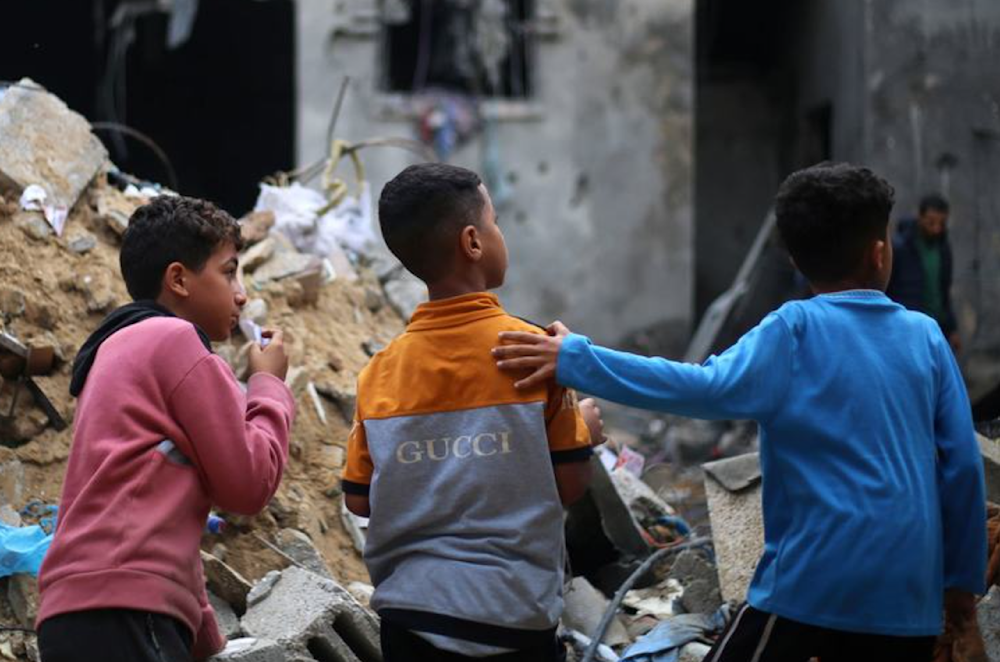Israeli war on Gaza leaving orphaned children in the thousand: NYT
The ongoing Israeli aggression and constant movement between shelters and hospitals make it impossible to determine how many children have been separated from their parents or have lost them permanently.
-

Children look at their destroyed homes in Rafah city, in the southern Gaza Strip. (UNICEF)
The war on Gaza is severely disrupting family structures, with many children becoming separated from their parents and making "so many orphans in such chaos that no agency or aid group can count them," The New York Times reported.
Medical staff report that injured children often arrive at hospitals alone and without any family to care for them, sometimes being labeled as “wounded child, no surviving family.”
In Khan Younis, a volunteer-run camp has been established to support over 1,000 children who have lost one or both parents. One area of the camp is specifically for children who have lost their entire families, with a long waiting list for such survivors.
The ongoing Israeli aggression and constant movement between shelters and hospitals make it impossible to determine how many children have been separated from their parents or have lost them permanently.
UN experts believe that at least 19,000 children are currently living without their parents, whether with relatives, other caregivers, or on their own, with the figure being certainly greater.
According to Jonathan Crickx, a spokesperson for the United Nations Children's Agency, previous conflicts did not entail as much bombing and displacement in such a tiny and populated region with a high number of children.
In April, 41% of the families assessed by Crickx's agency in Gaza were caring for children other than their own.
'No one to hold their hand'
A few infants have been born orphans after their wounded mothers died during childbirth, according to Dr. Deborah Harrington, a British obstetrician who worked in Gaza in December,
Far more frequently, children and parents are separated when Israeli soldiers arrest parents or, following an airstrike, youngsters are brought to hospitals alone amid the chaos.
Doctors said they have treated a large number of newly orphaned infants, many of whom are amputees. Dr. Irfan Galaria, a plastic surgeon from Virginia who volunteered at a Gaza hospital in February, expressed that “there was no one there to hold their hand, no one there to give them comfort."
Aid workers attempt to locate living parents or relatives with communication systems severely damaged and evacuation orders making it extremely difficult.
Some young children are so traumatized that they become mute and refuse to provide their identities, making the search nearly difficult, according to SOS Children's Villages, an aid organization that administers a Gaza orphanage.
A 3-week-old girl with no known relatives was among the preterm newborns that arrived at the Emirati Hospital in the southern city of Rafah in November. Amal Abu Khatleh, a neonatal nurse at the hospital who has unofficially adopted the child, attempted to find her parents, but to no avail.
One woman, Ms. al-Jaja told NYT that her sister Zahra Akeila and her husband were killed with her newborn in an October Israeli strike, leaving behind 4 sons in her care.
According to Crickx, orphans are more vulnerable to exploitation, violence, and abuse. If they see any peace, they will have limited access to housing, clean water, mental and physical health care, school, employment, and marriage opportunities.
Even for children who still have parents, growing up in post-war Gaza will be challenging, according to Mahmoud Kalakh, a charity worker who built the orphanage.
"So what about these children who have no source of income or provider, having lost their fathers or mothers?" he answered.
Only death is certain in Gaza, UNRWA says
The spokesperson for the United Nations Relief and Works Agency for Palestinian Refugees (UNRWA), Louise Wateridge, warned that death appears to be the only certainty for the 2.4 million Palestinians in Gaza, where "no place is safe" due to ongoing Israeli bombardments.
Speaking to AFP from within the besieged strip via video link, Wateridge described the dire situation, saying, "It does feel like people are waiting for death. Death seems to be the only certainty in this situation."
Having been in Gaza for two weeks, Wateridge is witnessing firsthand the scale of the humanitarian crisis, the pervasive fear of death, and the spread of diseases as the war drags on.
"Nowhere in the Gaza Strip is safe, absolutely nowhere is safe," she said from Nuseirat in central Gaza, a location frequently targeted by Israeli airstrikes. "It's absolutely devastating."
Wateridge highlighted the unprecedented challenges posed by the spread of diseases and poor sanitation, exacerbated by the Israeli blockade. Even schools, once considered safe havens, are no longer secure. "It feels like you're never more than a few blocks away from the front line now," she added.
The UNRWA spokesperson also noted that an increasing number of Gaza residents, exhausted by the Israeli occupation forces' constant evacuation orders, are becoming hesitant to move from place to place. "They feel like they're being chased around in circles," she explained, citing the difficulty of relocating, especially in the heat and with children, the elderly, and disabled individuals.
Wateridge also emphasized the deteriorating conditions for those still on the move, "there are rats, there are mice, there are scorpions, there are cockroaches," Wateridge said, adding that insects "spread disease from shelter to shelter" wherever they go.

 5 Min Read
5 Min Read








